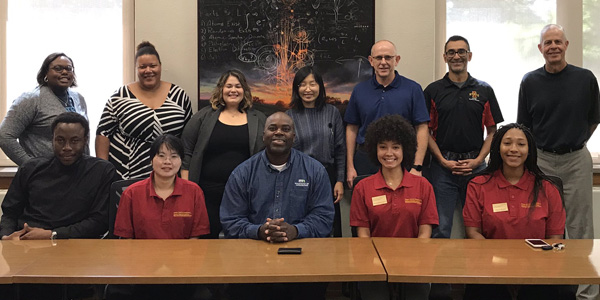
A Changing View of Ag
When Patrice Bailey surfaced from the subway and made his way home from high school in Harlem he saw both Meryl Lynch’s “Charging Bull” statue and the Apollo Theater.
As the assistant commissioner of the Minnesota Department of Agriculture, he has gained quite a different view.
Bailey (’01 MS agricultural education and studies and international agriculture) maintains an intense pace. He oversees outreach, agricultural marketing and development, dairy and meat inspection and food and feed safety.
During one week this fall, his agenda included visiting with the White Earth Nation and Tribal College, observing sugar beet harvest, engaging urban students in agriculture and facilitating panels on farm viability and how to foster inclusivity in agriculture.
“I serve as the tribal liaison and coordinate emerging farmer listening sessions to advance the success and sustainability of immigrant farmers, farmers of color and beginning farmers,” Bailey says.
He moved to Minnesota in 2005 and joined the Department of Agriculture this summer. He was previously the outreach coordinator for the Council for Minnesotans of African Heritage. Before moving to Minnesota, he worked at Wartburg College in Waverly, Iowa.
“Patrice has already demonstrated a skill for broadening the conversation around agriculture and state policy to include people who are often left out. His passion for agriculture and expertise working with communities of color are a vital asset to the Minnesota Department of Agriculture,” Commissioner Thom Petersen says.
How did this city kid from New York, New York, find his way to agriculture? His mom, a midwife, pointed the way.
“She said no matter where in the world I find myself I could always be employed in the agriculture industry,” Bailey says.
He earned a degree in agriculture from Prairie View A&M University, a historically black college in Prairie View, Texas, and says the legacy of George Washington Carver — Iowa State University’s first black student and faculty member — helped draw him to Iowa State for his master’s.
“My time at Iowa State was life changing. This university is really based on agriculture, and agriculture is based on relationships,” he says. “People here want to help you be successful.”
Bailey returned to Iowa State this August, and met with administration, faculty and students. “Be bold and courageous. Chart your own educational course. Your relationship building and community building start here,” Bailey told members of the Iowa State University chapter of Minorities in Agriculture, Natural Resources and Related Sciences, of which he was a member while a student.
He also visited with classes in agricultural education and agricultural economic policy. Students peppered him with questions about everything from hemp production, to mental health initiatives, to career opportunities in public service.
“Part of my job is to change the narrative about what agriculture is and what it isn’t. Agriculture is everything,” Bailey says. “In agriculture you can write your own ticket.”



